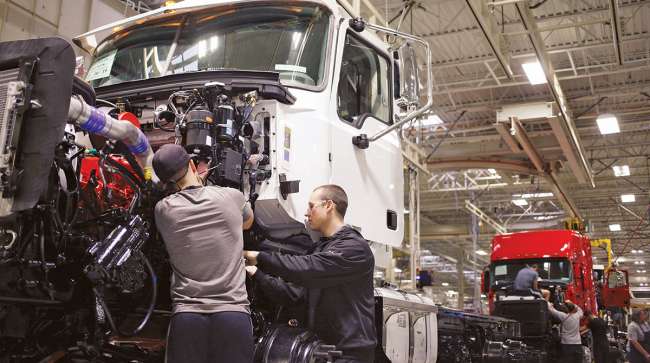Senior Reporter
Class 8 Orders in December Weak at 22,800

[Stay on top of transportation news: Get TTNews in your inbox.]
Class 8 orders in December were the second-weakest of the year. Production remained constrained by a bedeviling supply chain, which continued to make truck makers very careful about adding new orders to the pipeline, ACT Research reported.
Preliminary net orders were 22,800, according to ACT, which will revise the net total when truck makers release the final adjusted figures. December trailed all but November’s total of 9,902.
“That number, at almost 23,000, it’s not particularly strong; neutral is the way I would think about it,” said ACT Vice President Steve Tam.

Western Flyer Xpress has more than 1,000 trucks. (Western Flyer Xpress)
At an annualized rate that comes out to about 275,000, or a little above replacement demand. However, as was noted repeatedly in 2021, amid strong freight demand and robust rates fleets have been and remain ready to order many more trucks — if they become available.
Tam added there remains little certainty about how many almost-completed trucks are sitting on the sidelines awaiting one final overdue part. Some estimates, including ACT’s, put that number at 30,000.
“I think there’s an expectation the truck makers made some progress on reducing that in December, but we won’t know that until we see the actual December build numbers,” Tam said.
One fleet CEO said placing orders at the pace his company wants has proven extremely difficult, even as some truck makers have been easier to work with than others.
“Prices for all are going up, and commitments are being reduced,” Randy Timms, CEO of Western Flyer Xpress, told Transport Topics.
“Some truck makers are actually disregarding long-standing relationships and not giving us trucks at all, along with not making good on 2021 calendar year commitments for orders and pricing,” Timms said. “Apparently, their strategy is ‘highest bidder wins’ and we’re not playing that game. I’m pretty sure that will come back to bite them. It certainly will with me.”
The truckload carrier, based in Oklahoma City, offers local, regional, dedicated and over-the-road lanes to company drivers and contractors. It has over 1,000 trucks.
The supply chain troubles extend to suppliers.

Barna
“In respect to our industry’s supply chain dilemma, I believe those projecting a return to normalcy in 2022 might be a bit too optimistic,” Yokohama Tire Corp. CEO Jeff Barna said in a company Q-and-A session. To get to the true depth of the supply chain breakdown, one would need to dig down 12 or so layers, he said. He added that the approximately 85 steamships anchored off the Port of Long Beach only represent the tip of the “macro” iceberg.
“Understanding the micro factors building up to this backlog would require a deep analysis — and recovery projections — of microchip shortages, plant shutdowns, labor unrest at the ports, driver shortages, excess container complications, potential freight company arbitrage, market supply/demand and more,” he said. “The point here being that even if some or most of these are remedied in the near future, it will likely be 2023 before realignment of all variables is achieved.”
In response to the continued rise in operational costs, Yokohama announced it will implement an as-yet unspecified price increase on consumer replacement tires and commercial truck tires sold in the U.S., effective Feb. 1.
Experts cite higher raw materials prices and increased manufacturing, transportation and disposal costs as factors affecting the tire industry.
Don Ake, vice president of commercial vehicles at FTR, said “everyone is upset” about supply chain-driven problems.
FTR pegged December’s preliminary net orders at 23,100.
Truck makers have managed their customers and allocations individually, he said, as prices have increased and orders are resubmitted at higher prices to reflect commodity and component price increases.
“In the whole trucking industry, no one is happy about this because everyone suffers to some degree on different things,” Ake said.
One sign of the future is showing up in orders as reported by Nikola Corp. Nikola reported Saia LTL Freight, a unit of Saia Inc., signed a letter of intent to accelerate the implementation of heavy-duty electric trucks — including the purchase or lease of 100 Nikola Tre heavy-duty battery-electric vehicles following the satisfactory completion of a demonstration program.
Saia ranks No. 20 on the Transport Topics Top 100 list of the largest for-hire carriers in North America.
Nikola expects production of those 100 vehicles for Saia to occur between 2022 and 2024 with the initial 25 targeted for 2022, according to Phoenix-based Nikola.
Nikola sales and service provider Thompson Truck Centers recently announced USA Truck Inc. signed a letter of intent to order an initial 10 Nikola Tre BEV trucks from Thompson — expected to be delivered in the first half of 2022. The agreement also included the option to purchase an additional 90 Nikola zero-emission trucks over the next two years.
USA Truck ranks No. 65 on the for-hire TT Top 100 list.
Want more news? Listen to today's daily briefing below or go here for more info:




